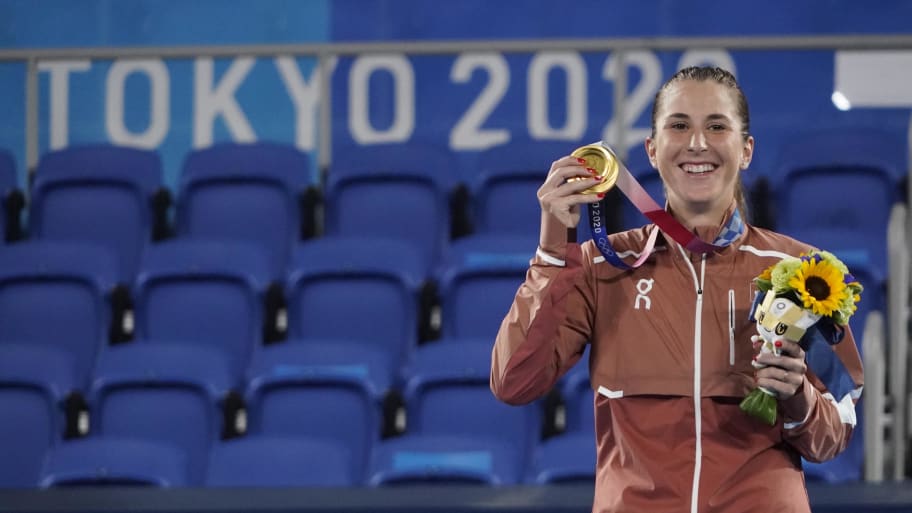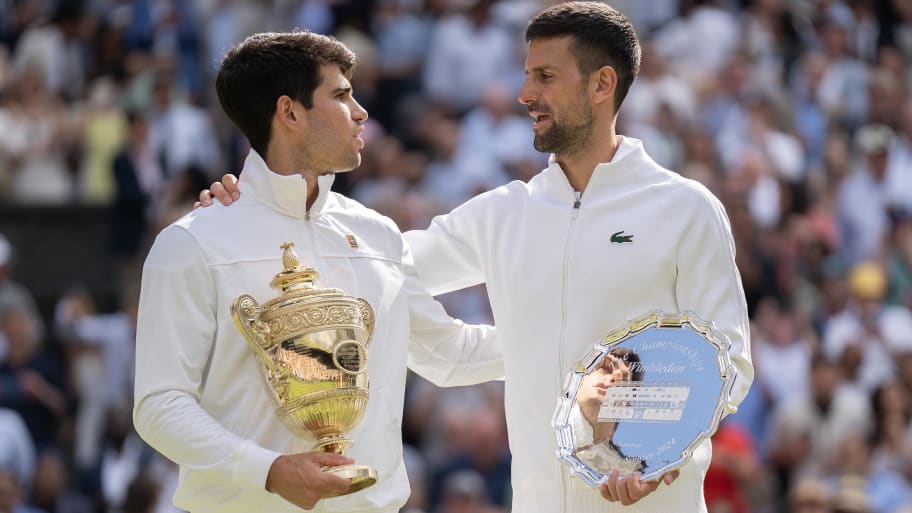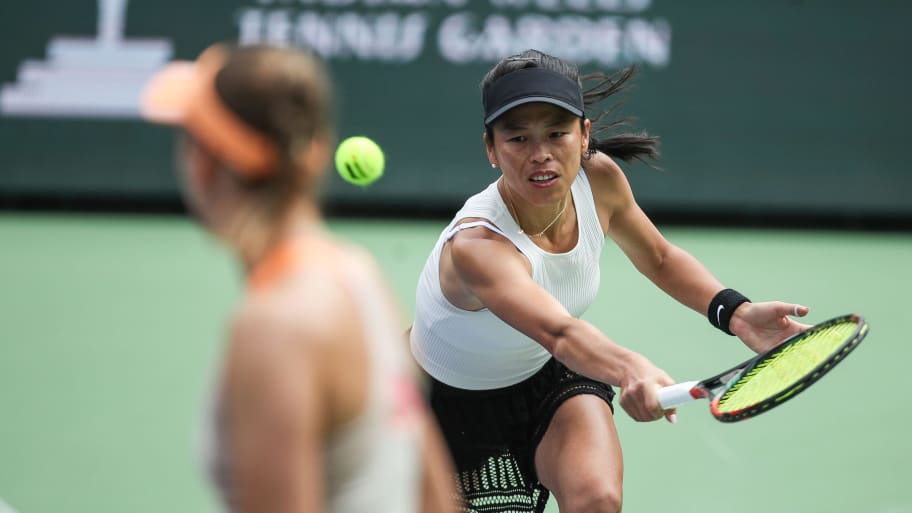
Submissions have been lightly edited for brevity and clarity.
• Here’s the most recent episode of the Served podcast.
• Speaking of Served, Andy Roddick and I are doing our first live show next month, in conjunction with the Cincinnati Open.
Served is hitting the road! 🧳 We’ve teamed up with @CincyTennis for our FIRST ever live podcast recording. Come hang with Andy and Jon @SonderBrewing at 6:30 on August 9! It’s completely open to the public, and we seriously can’t wait to hang with you guys. 🎙️🎾 pic.twitter.com/rSXU0n0GZz
— Served with Andy Roddick (@Served_Podcast) July 23, 2024
Onward … and note yet another strong reader riff/rant to take us out.
Jon, as a tennis fan, I have a question about the sport in the Olympics. It seems like people such as yourself are hyping tennis in the Games. I’m not feeling it this year and I wonder if this has jumped the shark. We just had the French Open and then Wimbledon and the U.S. Open is a few weeks away. Do we really have space for [Paris 2024], another big event?
M. Ellliott, Manhattan
• I’m not sure I would go that far. The consensus among players seems pretty clear, and we take our cue from the athletes. If it matters to them, it matters to us. And vice versa. Olympic gold is slightly below a major singles title in terms of significance, and squarely above a Masters 1000 or year-end title. (Interestingly, Olympic gold in doubles—to say nothing of mixed doubles—ranks higher than a major.)
Inasmuch as you sense a dip in enthusiasm, let me suggest a few explanations. First, as you note, is timing. We are barely six weeks removed from a major event held at the same venue. And we are barely a week removed from Wimbledon. We’ve hardly been given time to pivot to yet another high-stakes event.
But my prediction: We will see Rafael Nadal, Novak Djokovic and Iga Swiatek in the opening ceremony floating down the Seine. We will see Coco Gauff as the flag bearer for Team USA alongside LeBron James. We will hear the theme music and see Roland Garros as never before. We will see players compete without logos and patches, save their national flags, and realize this is special. We’ll also see players cry when they win and lose and we, as fans, will catch the fever.

Second, the format guides us. It’s best-of-three tennis in Paris. No guaranteed day off between matches. One week versus the two for majors. Players entering two, and sometimes three, events. There are cues that suggest to fans this isn’t the equivalent of a major.
Finally, I write this as an unabashed Olympics fan. But indulge this pet theory which might explain a perceived drop in enthusiasm: for decades, a great appeal of the Olympics came from a sense of mystique. How did country X’s athletes match up against country Y’s? This was the big reason the “Miracle on Ice” hockey game had such resonance in the U.S. Russia’s players came shrouded in mystery. This was at the height/depth of the Cold War and the U.S. had a proxy for war against a mysterious enemy. And when the Americans won against this unknown opposition it was validation that our warriors were superior.
Today, globalization and technology have bleached so much of the mystique. In the macro, this is a good thing. A flat world, with more connection and access, benefits more than it burdens. But it’s to the detriment of the Olympics.
Today, we know many of the athletes in advance. (If we don’t, they are a Google search away.) Today’s Russian hockey players? They aren’t phantoms behind the Iron Curtain; they are likely playing in the NHL.
Likewise, how are Americans supposed to generate a rooting interest against, say, Victor Wembanyama when we not only know him to be a charming and admirable guy, but he plays for San Antonio and tours our cities’ arenas? Even if he—and the other NBA players on the French team—face Team USA for gold, doesn’t fervent nationalism seem sort of … silly?
Again, on balance, this is a force of good. It’s great that so many athletes from all countries went to college in the U.S., or now make their living here or simply train here. (Note how many Caribbean track stars train in South Florida.) Conversely, it’s great that so many U.S. athletes can train, play and benefit abroad. And it’s great that an increasingly large cohort of athletes like Joel Embiid can choose which country they want to represent. If the abiding goal of the Olympics is unity through sports and a sort of cultural exchange, we are all winning! But it strips away some of the essential mystique and can make nationalist rooting ring a bit silly.
The same is true for tennis. We know the athletes already. We even know them in this venue. (How will Swiatek fare on the red clay of Roland Garros? That’s been answered decisively already.) Fans love Djokovic, Nadal and Carlos Alcaraz. Most are not going to change those loyalties just because the opponent happens to be from a certain country.
None of this is to disparage the Olympics. It’s a wonderful event. Tennis belongs. Nadal skipping Wimbledon to prepare … Andy Murray delaying his career omega so he can try to play … Djokovic entering and speaking openly about his medal ambitions …videos like this from Rio … Again, we take our cues from players.
But if a gold medal doesn’t measure up to a major, maybe this—more than the absence of prize money or points or a two-week format—is why.
Hi Jon,
Who is now more likely to equal or exceed Roger Federer’s record eight Wimbledon titles, Alcaraz or Djokovic?
Ted Cornwell, Minneapolis
• I started answering this question and was struck with a deep sense of embarrassment, both personally and collectively. Can we, as a community, discuss that we have gone all these years without a Ranking Roger reference?
Where were we? Oh, right. Who is more likely to win eight Wimbledon titles? Great probability question. One player (Djokovic) is much closer, but he also has so many fewer opportunities. For that reason, I’ll take the Alcaraz option. It sounds silly to the ear, not dissimilar to the June discussion about whether Swiatek can win double-digit Roland Garros titles. But as a matter of math … he already has two and is not yet 22 years old. Contrast this with Djokovic, who will turn 38 next year and hasn’t won Wimbledon since (gasp) 2022.
Of course, we could just as easily point to Boris Becker as someone who won big early and was on a record-setting trajectory. But for a variety of reasons—health, competition, a bad day—he never got within sniffing distance of eight Wimbledons.
It may be a lame answer but let’s acknowledge Alcaraz’s encouraging start. Four major titles—and two Wimbledons—at barely 21 years old is wild. Let’s also manage expectations and recognize the folly of extrapolations.

Hey Jon,
Closing out another Wimbledon got me thinking … Your next book assignment, The Lost Generation. I know you wrote a mailbag about it last year, but it's worth revisiting. Please fact-check me on this—Thirty-seven-year-old Novak Djokovic’s closest competition is a 22-year-old from Italy and a 21-year-old from Spain. Only two (TWO) men between 23 and 34 have won a major title, with one of them retiring this year. If [Stan] Wawrinka, Murray, [Marin] Cilic, and Nadal don't play another professional match after this year, then only one active player in their 30s will have a major title—Djokovic.
Apologies for not asking a question :)
Duane, Washington DC
• This is a theme this week. We can either reflect on the excellence of the Big Three, or we can malign the other players who did not mount sufficient challenges. I’ll take the former.
After this year, at Wimbledon, only one active men’s player between the ages of 25 and 35 had won one major (Daniil Medvedev). Only one men’s player born in the ’90s had won a major. Before Alcaraz, Djokovic at 37 years old, is the youngest player to have won Wimbledon.
Hi, Jon. Assuming Wimbledon still uses line judges next year, I'd like to pass along a tip to the players: Don't help your opponents with challenges by throwing up a finger to say that a ball was out. Let your opponent decide and, then, possibly lose a challenge. I'm not advocating any sort of gamesmanship (e.g., pretending a ball was in when it was out), but why not just stay mum on the subject and let your opponent make the decision?
Jason, Austin
• Funny, I would argue the precise opposite. Instead of acting oblivious to a call, adverse to your opponent, you think may have been missed … why not act preemptively? A) It is a sporting gesture and the honorable (if not outright ethical?) path. B) Assuming the opponent challenges, you will get a resolution anyway. C) Fans remember small acts of sportsmanship far longer than they do who won a given point, or even a match. From Andy Roddick conceding a point on clay—which led to a Frank Deford radio essay!—to Justine Henin’s alleged “lying and fabricating” to Tim Smyczek giving Nadal a first serve deep in a fifth set, the shelf life of these small gestures is considerable.
Jon, don’t forget to find us the answer to how many players in the Tennis Hall of Fame have less than 25 tournament wins for when you do Served later.
@Jonathanmbc1980
• This is in response to a discussion Roddick and I had about Djokovic’s absurd numbers at majors. (He has won nearly 50 more matches at majors than borderline Hall of Famer Dominic Thiem has won, in total, for his excellent career.)
Again, let’s stress that this exercise is in service of propping up Djokovic (as if he needs it) rather than denigrating anyone else. But, yes, it is shocking that he has more major singles titles than other Hall of Famers have total singles titles. Candidly, I don’t have the time—and couldn’t figure out the coding—to come up with a complete list. But a smattering of examples:
Gustavo Kuerten: 20
Michael Stich: 18
Mary Pierce: 18
Marat Safin: 15
Jennifer Capriati: 14
Pat Rafter: 11
Djokovic majors: 24
So, Jon, I note that [Su-Wei] Hsieh continues to have no racquet sponsor or apparel/footwear sponsor. The top doubles players always have at least a racquet deal where they get free sticks and strings in consideration for having the racquet brand stencil on the strings. Hsieh, despite her great success in the doubles space, has NO deals and not even the one-off patch deal when on Centre Court in Mixed Finals. My belief is that, as she is from Taiwan (known solely as Chinese Taipei in the Olympic Movement at the directive of the IOC), no endemic tennis brands or other brands will touch her out of fear of retribution from Mainland [China].
Jeff, USA
• This is more a thought exercise than a question that I—or anyone—can answer with certitude. Which is part of the problem. There is an absence of accountability. We should add: A) It’s hard to conceive of a player more worthy of your respect and admiration than Hsieh, still going strong at 38, and doing so with a singular style. B) After the WTA’s craven return to China amid so many unanswered questions and unmet demands—note Peng Shuai’s social media presence, or lack thereof—these kinds of questions and this kind of skepticism will persist.

Hi, Jon,
Your word request for players putting on their watches without a thought intrigued me. I first thought of walking merchandising, but that would include logos on caps, sleeves, tops. I switch my focus to the body part. What about "wrist bannering" or "wrist branding"?
Regards,
L. Pereira (Canada)
• Thanks for playing. Again, the quest was to come up with a Sniglet—that reference is really dated, no?—for the act of players winning matches and reflexively heading to their bags to put on their snazzy sponsored watches before doing an interview. The winner is reader Michael Mangarelli for his submission: Rol-Flex.
Hi Jon,
Maybe this has already been mentioned, but a few weeks ago in the mailbag, someone was asking about how to identify the commentators on various tennis streams. I found this website to be really useful. Most of the Tennis Channel Plus streams use the "World Feed"...
Michael Dunn
• Thanks much. The periodic aside: as is the case with players, fans have their favorite commentators, which is often a matter of personal taste and not objective—much less quantifiable—measure. Your idea of buffoonery is someone else’s wit. Your idea of personal revelation is someone else’s insufferable narcissism. Your idea of color is someone else’s off-color.
SHOTS:
• Congratulations to Peter Foukal and the Tennis Sesquicentennial Committee for organizing a wonderful event last week, honoring U.S. tennis, first played in August 1874 by Richard Sears and James Dwight, in Nahant, Mass.. Tim Mayotte did a turn as a special guest. Bud Collins is smiling looking down.
• ATP, Tennis Data Innovations (TDI) and Sportradar have teamed up to launch Safe Sport, a new service to address online abuse targeting professional tennis players.
• The International Tennis Hall of Fame unveiled the Chris Evert Learning Center as the new name for the Canfield House building, located on the ITHF’s grounds in Newport, R.I.
• The Billie Jean King Cup by Gainbridge (BJKC), the women’s World Cup of Tennis, announced that its 2024 finals will relocate from Sevilla to nearby Málaga, Spain, and take place alongside the men’s Davis Cup Final 8. The BJKC Finals dates and match schedule will remain unchanged, commencing on Nov. 13.
• David B. take us out:
Hi Jon,
Great to read the entry and your response on Coco Gauff's coaching experience at Wimbledon. I couldn't agree more. Not so much following up with this as a potential mailbag item (too ephemeral?), but I've long thought about the sidebar issue to this which is … interacting with your box AT ALL during a match, completely unrelated to coaching. I write this not from a should-it-be-legal-or-not point of view but from here:
Every match involves two “Energy” Contracts. One is between the crowd and Player 1, and the other is between the crowd and Player 2. When a long and exciting point ends with an amazing winner from the point's underdog/defender/scrambler and the crowd explodes with a roar, there's nothing cooler than the winning player doing … absolutely nothing other than a fist pump, turn, and pace off with coordinated entry into intense thought about the next point. Doing this holds firm the contract and maintains the buzzing electrical connection that was just boosted with excitement.
When instead the player turns to their box and celebrates/gestures/interacts with their team (or the loser of the point angrily gestures and complains to their box), to me (and maybe no one else notices this, or maybe I'm imaging it and it doesn't really exist) it's like adding a third node or participant to the contract. The terrific energy just generated then partially bleeds away and the overall buzz—in the stadium, on TV—dips. Is it a deal breaker that makes me want to change the channel? For sure not, but you do lose a bit of the drama of self-reliance, which you stress the importance of although from a different angle.
This article was originally published on www.si.com as Tennis Mailbag: Where the Olympics Fall on a Packed Calendar.







